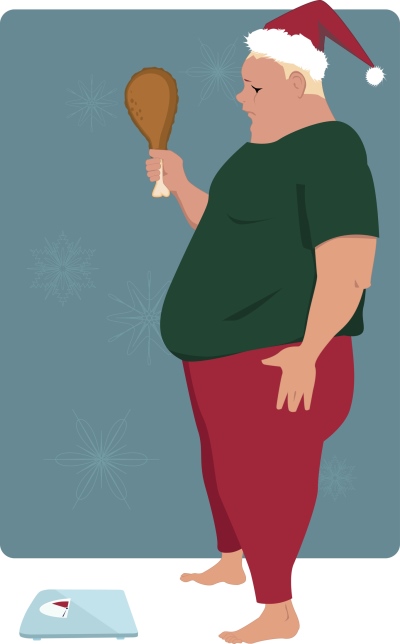DrCarney.com Blog
Fifteen Tips to Avoid Holiday Temptations and Weight Gain
Holiday celebrations center around friends, family, food, and fun. Yet celebratory meals typically include many rich, calorie-dense foods; resulting in a 5-10 pound weight gain for most people. For those that are young, trim and not reversing a serious disease, an occasional treat on special holidays would most likely not have a negative impact on overall health if it was an exception for those that consume an extremely healthy diet the rest of the year. However, if you don't want to erase all the successful weight loss you've achieved over the past few months and you're inclined to overeat during the holidays, below are some ideas to help keep you focused on the festivities and not the food so you can enjoy your time with friends and family!
1. When you're invited to a dinner party If you feel you will be tempted to eat unhealthy foods, eat something healthy before arriving at the party. You will be less tempted to eat the wrong foods if you don't feel ravenously hungry. Instead of focusing on satisfying your hunger, focus on spending time with your family and friends, developing closer relationships, and partaking in the joyfulness of the holiday season!
2. Fill up on water before the party - If your thirst is quenched beforehand, you'll have less room in your stomach and be less motivated to add liquid calories in the form of eggnog, alcohol, cider, or sweetened beverages. Fill up with bulky, low-calorie plant foods. A fuller stomach also leaves less room for calorie-concentrated desserts, etc.
3. Stay away from the dessert table - If we can't reach the sugary desserts, we can't put them into our mouths! It's a simple trick, but keeping ourselves busy in another area of the room can keep us out of temptation's way.
4. Eat slowly - At parties, there's often social pressure to join in the eating. By nibbling slowly while we socialize, we can mitigate the peer pressure and still be true to our dietary goals. Eating slowly also gives our body the chance to signal the brain when the stomach is full. When the stomach receives food, a series of events takes place....hormones are released, blood sugar rises, and the stretch receptors in the stomach determine whether or not the stomach has received enough food. These events send signals to the brain that we have eaten enough. Once the stretch receptors and hormones are activated, it takes approximately 20 minutes for the appetite center of our brains to register that satiety has been reached. Feeling satiated helps to prevent overindulging in rich foods.
receptors and hormones are activated, it takes approximately 20 minutes for the appetite center of our brains to register that satiety has been reached. Feeling satiated helps to prevent overindulging in rich foods.
5. Fill up on the fruit or veggie tray - At most holiday gatherings, there's either a plate of veggies or a fruit tray. These whole foods will satisfy our hunger as well as our nutritional needs. Avoid dips with high-fat, injurious ingredients like dairy and oils.
6. Bring one or more plant-friendly dishes to the party that you and your family can eat - This not only provides a healthy alternative for your family to enjoy, it encourages others to try the new flavors and textures of whole, natural plant foods. It may even inspire others to include more plant foods in their diets!
7. Identify trigger foods - Chocolate, pastries, candies, salty snacks, cookies, and eggnog are highly-palatable foods that stimulate the reward center of the brain. The high concentration of salt, sugar and fat in these foods compels us to eat more of them. Once you know who the enemy is, it's easier to develop strategies for winning the battle of temptation! For more information, see our blogs/articles on food addictions.
8. Remind yourself that the pleasure from eating addictive food is only temporary - yet the weight gain, guilt/depression, and the negative health effects can last for years. These foods bring us momentary pleasure while they speed up the aging process and can remain on our hips/waistline and clog our arteries for a lifetime!
9. Have an accountability partner - When you attend parties, let your spouse, other family members, or close friends know your health goals. Have them ask you how you're doing. Knowing that they will be asking you this question will help you avoid those nagging temptations.
10. Keep your health goals in mind - According to the World Health Organization, 80% of all deaths are caused mostly by poor lifestyle habits and a fruit and vegetable deficient diet. With this in mind, when you're committed to a goal, it's much easier to say "no" to anything that prevents you from reaching your target. Practice saying "no thank you" at home, so it's much easier to say in a social setting!
11. Don’t shop for food when you're hungry - This time of year, the stores are filled with goodies ready to jump into your basket at our first sign of weakness. You can protect yourself from this onslaught of temptation by satisfying your hunger before you shop!
12. Keep your kitchen and pantry filled with healthy food options - Provide healthy foods for your family while at the same time keeping the junk food out. If family members wish to consume junk food, ask them to consume it away from home. If it's not available in the home, you will be less tempted to eat it. Impulsive eating almost always involves choosing high calorie, low-nutrient food items. My blog, Losing Weight Without Losing Your Mind, highlights the work of Doug Lisle, PhD, who explains in detail how our bodies instinctively crave foods that are high in sugar, salt, and fatty foods.
13. When food cravings hit, go for a walk or other constructive activity - Food cravings don't last very long and will soon pass. Learning to direct our attention on another activity will be hard at first, but it becomes easier with time. Create space between you and the temptation by walking into another room or going outside.
14. Put a picture of when you were at your heaviest weight on the refrigerator - It's a good reminder of why you're doing what you're doing and the progress you've made. Those highly addictive desserts become less appealing when you remember how destructive they are and how they rob you of your physical, emotional, and spiritual well-being.
15. Are the few minutes of pleasure produced by addictive foods really worth dying for? - Many people say that they would "rather eat the foods that they love (addicted to) and die sooner than change the way that they eat so that they'll live longer." Because of this widely-accepted perspective, eighty-one million Americans suffer from cardiovascular disease, killing one out of every three people or 831,000 each year. For many, Thanksgiving marks the beginning of a month-and-a-half long feast on disease-promoting foods. This would explain why the majority of fatal heart attacks occur during the holiday season and during Super Bowl. Compromising healthful food choices even temporarily, produces adverse and immediate health consequences. It may surprise you to know that the beginning stages of heart disease can be seen in children as young as three years of age. See my articles Who Has Heart Disease? and How do the Majority of Heart Attacks Occur? The Physician's Committee for Responsible Medicine also has a wonderful infographic called What Happens after Only One High-Fat Meal?
Take control over addictive cycles - don't let them control you!
The above tried-and-true strategies will help you break free from damaging and seductive foods. These tips will also equip you to stay focused on the fun while not abandoning all of the progress you've made. Do you have a tip on how to avoid food temptations over the holidays? Leave a comment below and help someone else as they progress towards their health goals this season!
Preview the "Why We Do What We Do?" Trailer
Controlling Cravings: Have you ever asked yourself "Why did I eat that?" Get science-based answers, now! Gain freedom from addictions. Understand underlying causes. Make lasting changes more easily than ever. Strengthen your ability to choose healthy foods through empowerment from Dr. Carney's Starch-Smart® System. Let's boost your 'biochemical willpower' for good. Help is here, from Linda Carney, MD, for all who struggle with bad habits, food fixations, and cravings.
When you subscribe to the blog, we will send you an e-mail when there are new updates on the site so you wouldn't miss them.




